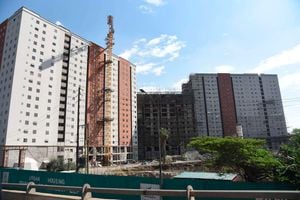
The overall cost of homeownership tends to be higher than renting even if your mortgage payment is lower than the rent.
In 2023, the cheapest newly built house by a formal developer in Kenya cost Sh960, 000, according to research that was done by the Centre for Affordable Housing Finance in Africa (CAHF).
The unit was cheaper than average as it was part of the state-driven Pangani Affordable Housing Project, whose land and materials were available at highly subsidised costs.
After the necessary statutory deductions are made, data from the Public Service Commission and various trade unions reveals that the average Kenyan worker takes home no more than Sh30,000 a month.
Assuming that the normal mortgage metrics were applied in acquisition of the Pangani unit, Sh30,000 would not be enough to acquire the cheapest house built in the country.
If an initial deposit of 30 per cent was paid and the balance spread out over a 20-year period at 15 percent per annum, the highest most families could afford is a house that costs slightly above Sh700,000.
Housing is a fundamental human need, yet housing unaffordability continues to be a major issue in the country, with many Kenyan families unable to buy or build their own homes.
Underlying this limited affordability are high unemployment rates, unequal income distribution, high inflation rates, low household incomes and widespread poverty.
“The issue of affordability comes back to the income discussion. The truth is that we are operating in a low-income environment, so maybe the conversation we should be having is do we go for affordable ownership or affordable rental,” says Allan Mutuma, Open Access Manager at CAHF.
Against an annual demand of 250,000 housing units, the state plans to construct about 200,000 units every year, to ensure that every Kenyan has access to decent and affordable housing.
Through a robust public private partnership framework and the effective use of new technology, much progress has been achieved in constructing the units and bridging the two million housing gap indicated by the National Housing Corporation.
However, with the average building cost having jumped up by close to 20 per cent over the last five years to average between Sh68,000-Sh74,000 per square metre depending on the type of building, not many Kenyan families have been able to afford these units.
Pump prices have increased significantly, leading to a rise in the cost of transporting construction materials to site. The cost of manufacturing those materials has also increased, as has the cost of labour.
“Incomes are not growing as fast as other factors of production, which brings into question the issue of affordability altogether. Maybe what we just need to be providing are decent houses for individuals to be able to rent,” says Mutuma.
The price of land for development has also sharply increased over the years, with data from real estate firm HassConsult showing that in 2023, the average price of an acre of land across the city's suburbs grew at the fastest pace since 2015.
Within the year alone, 14 out of the 18 suburbs in Nairobi recorded significant price movements, with Muthaiga, Ridgeways and Loresho standing out with growths of 3.7 percent, 3.6 percent and 3.1 percent respectively.
In some of Nairobi's satellite towns including Ngong, Syokimau, Ruiru and Kiambu, prices went up by up to nine percent in the year under review.
“It has become very difficult to get affordable serviced land to build on, and because of this, rental homes are becoming the most financially realistic option especially for low and moderate-income families in high-cost markets,” remarked Mutuma.
The real estate and research professional points out that affordable rental housing is an important stepping stone that can allow families to accumulate savings and prepare for homeownership.
"Rental can also be a stable and affordable option when the mortgage terms and home prices are out of reach of families’ budgets,” says Mutuma.
According to official data, only 11 per cent of Kenyans are able to afford a conventional mortgage. By the end of 2023, there were reportedly only 30, 015 mortgages worth Sh281 million with an average mortgage size of Sh9.4 million.
“When incomes are uncertain, mortgage commitments cannot be guaranteed. The standard requirement for mortgage eligibility is proof of formal employment or verifiable income, something that the majority cannot provide,” says Joseph Ndambuki, a real estate investment professional.
The overall cost of homeownership tends to be higher than renting even if your mortgage payment is lower than the rent.
Mortgage interest can make up nearly all of your monthly payments in the early years of a long-term mortgage. It can take as many as 13 years before more of your payment goes toward the principal balance in a 20-year home loan.
There is the option of non-mortgage housing finance that can be accessed as personal loans through savings groups and cooperatives or as unspecified micro-loans.
The challenge with this form of financing, however, is that it is often smaller and has a shorter repayment holiday than what would be required for housing purposes.

Mortgage interest can make up nearly all of your monthly payments in the early years of a long-term mortgage.
Over and above, renting a property doesn't come with all the responsibilities associated with homeownership and you have more flexibility, as you aren't necessarily tied down to your property.
Renting means that you can be able to move whenever your lease ends, however, it also means that you may have to move suddenly if your landlord decides to sell the property, convert it or increase the rent to more than you can afford.
When you rent, you know exactly how much you’re going to spend on housing each month, although on rare occasions, renters could face unpredictable rent increases from time to time.
Owning your home on the other hand gives you a sizable investment, but it does come at a big cost, both upfront and over the long run. It is more difficult to predict the expenditure per month when a home is owned, as opposed to when it's rented.
You may find yourself with an unexpected leak in the roof for instance, whose cost of replacement may not be covered under your home insurance policy. You could also end up spending more on repairs and maintenance than the actual value of the home.
“The biggest myth about renting is that you're throwing away money every month. This is not true. While it's true that you aren't building equity with monthly rent payments, not all of the costs of homeownership always go toward building equity,” says Ndambuki.
Affordable rental housing also frees up funds within families’ tight budgets to spend on healthcare and food. Studies have shown that children whose parents have less financial housing burdens benefit from better nutrition.
For parents, living in decent, affordable housing also means reduced stress due to a lessening of concerns that high housing costs will lead to foreclosure and eviction. This in turn leads to fewer physical and mental health problems and reduced absenteeism on the job.
While on paper, the benefits of renting in a developing economy such as Kenya may far outweigh those of owning, it is important to consider whether in the long run, it would be better to go through the trouble of owning, based on a number of key considerations.
“Some people buy homes when financially, they would be better off renting, because to them, owning a home is a form of an investment that minimises tax deductions. Others rent to save money when in fact, buying a house would amass them a larger net worth over time,” posits Ndambuki.
The benefits of homeownership accrue over the long-term through the accumulation of home equity. Importantly, the equity accumulation isn’t pure profit, rather, works to offset some of the many costs of ownership such as taxes, insurance, debt service, maintenance and repairs.
“Still, a home purchase is a big commitment, and you likely won’t accumulate a large amount of equity right away. It generally takes several years to recoup your money and see any equity gains,” remarks Ndambuki.
The decision to own or rent may be primarily financial, but there are other factors such as how long you plan to stay in an area that should be brought into consideration also. Typically, the longer you plan to stay in a home, the more financial sense it makes to buy.
However, for those who move around a lot whether for work or any other reason, it would be more practical to rent as opposed to buying a home. Renting means that you can move without penalty each time your lease ends.
“Changing your mind about where you want to live is always very difficult when you own. You might not be able to sell when you want in case the housing market is down, and even if it’s up, there are significant transaction costs involved in the process,” says Alfred Gichira, a realtor.
You should also take into consideration how much you can comfortably spend. First, calculate how much money you earn every month.
After deducting what you spend on essentials like food, transportation and emergencies, you will be left with what you can comfortably use for your housing.
A good rule of thumb is to keep the total housing costs, whether renting or owning, at around 28-30 per cent of your gross monthly income. It is always wise to leave some cash reserves.
It is also recommended to run a simple price-to-rent ratio analysis by dividing the home price by the annual rent of a comparable unit. If the ratio is less than 20 per cent, owning would in this case be better than renting.
“Buying a home involves serious financial considerations. Most people think in terms of mortgage loans, but there are other payment options, including equipment financing, crowdfunding or construction loans that may better favour the buyer’s financial situation,” says Gichira.
If it is a construction loan, then one has to bear in mind that the repayment has to be made within a specific timeline, failure to which one could be subjected to huge penalties.
Before deciding whether to rent or build, one also has to consider the risks involved in building/ownership such as delays in construction or delivery of property that differs from what was shown in the sample.
The home location is also highly influential while deciding whether to own or rent, as it not only affects ones’ disposable income, but also the lifestyle and the size of the savings one can accumulate over the years.
"If you buy a home and later decide to move out or happen to have a spare room, there is always the option of renting to someone else and using the rental income you receive to cover your mortgage payment," says Gichira.











